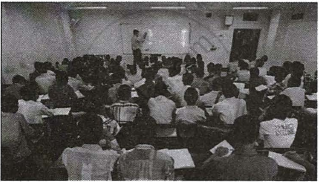Advertisements
Advertisements
Question
Find the value of k for which the system of equations
3x - y = 5, 6x - 2y = k
has no solution
Solution
The given system of equations:
3x - y - 5 = 0 ….(i)
And, 6x - 2y + k = 0 ….(ii)
These equations are of the following form:
where,
In order that the given system has no solution, we must have:
Hence, equations (i) and (ii) will have no solution if k ≠ -10.
APPEARS IN
RELATED QUESTIONS
Draw the graph of the equation y – x = 2
In the following systems of equations determine whether the system has a unique solution, no solution or infinitely many solutions. In case there is a unique solution, find it:
x − 3y = 3
3x − 9y = 2
Find the value of k for which each of the following systems of equations has infinitely many solutions :
4x + 5y = 3
kx + 15y = 9
Find the value of k for which each of the following system of equations has infinitely many solutions :
8x + 5y = 9
kx + 10y = 18
Solve for x and y:
2x + 3y = 0, 3x + 4y = 5
Solve for x and y:
The denominator of a fraction is greater than its numerator by 11. If 8 is added to both its numerator and denominator, it becomes
The sum of two numbers is 1/6 and the sum of their reciprocals is
Abdul travelled 300 km by train and 200 km by taxi taking 5 hours and 30 minutes. But, if he travels 260km by train and 240km by taxi, he takes 6 minutes longer. Find the speed of the train and that of taxi.

Read the following passage:
|
A coaching institute of Mathematics conducts classes in two batches I and II and fees for rich and poor children are different. In batch I, there are 20 poor and 5 rich children, whereas in batch II, there are 5 poor and 25 rich children. The total monthly collection of fees from batch I is ₹9,000 and from batch II is ₹26,000. Assume that each poor child pays ₹x per month and each rich child pays ₹y per month.
|
Based on the above information, answer the following questions:
- Represent the information given above in terms of x and y.
- Find the monthly fee paid by a poor child.
OR
Find the difference in the monthly fee paid by a poor child and a rich child. - If there are 10 poor and 20 rich children in batch II, what is the total monthly collection of fees from batch II?

